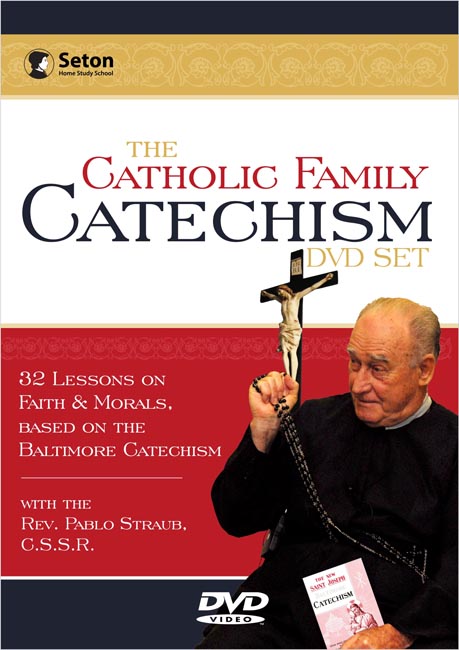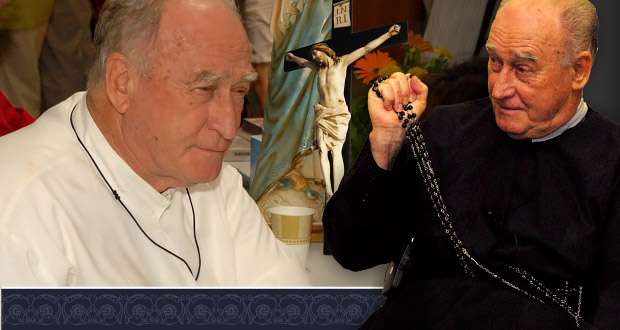By Fr. Pablo Straub
At first it seems contradictory that there would be similarity between those who marry and those who go into a monastery or the priesthood.
Can there be any two things more unlike?
But there is a great, great similarity between the Sacrament of Matrimony and the Sacrament of Holy Orders. When a person chooses one man or woman with whom to enter into Matrimony, he or she is giving up every other man or woman.
When a person enters a seminary or monastery or convent, he or she is giving up marriage with every man or woman, but choosing to live entirely to please one Person, God.
Everyone has a “vocation” to seek God. When God is calling a man to the religious life or the priesthood, God is saying, “Give Me your heart.
Everything, all happiness I could have given you through a sweet lady companion, I will give to you directly.”
A woman may search for happiness in marrying and loving a man. But Jesus might say to her, “I am calling you to give all of yourself to Me directly. I will make you happy directly.” On the other hand, God may call a man and a woman to find Him by seeking together.
Growing in the Faith
People call priests “Father” because, in a way, as he helps people grow in the spiritual life, he is like a father of a family. Many sisters or nuns are called “Mother”; they are like mothers because they serve others. In some countries, even young novices are called “Mother”.
In Mexico, I saw a very old lady pass by a very young nun, and she called the young nun “Mother”. Those who are called to the convent or monastery or seminary know life is all about fatherhood and motherhood, caring for others and their spiritual and temporal welfare.
Priests are continually happy for their spiritual children, just as parents are happy when teaching their children about Jesus, and when they show signs of growing in the Faith. Priests and parents both have a deep sense of the beauty of what Jesus is doing, seeing how Jesus draws people to Himself, and how Jesus makes them holy.
This is the mission of Jesus, to draw souls to Him. He does t his chiefly through priests, nuns, and parents, and this is why you can talk about a domestic monastery.
Monastic life is characterized by poverty, chastity, and obedience. Monasteries started out with religious men gathering in caves and living in extreme poverty. St. Benedict and other saints who started monasteries drew their inspiration from the life of Jesus.
They wanted to be imitators of Christ. Jesus said, “If anyone would come after Me, let him take up his cross and follow Me.” We know we are all called to follow Jesus and to imitate Him. Some follow Him as priests or religious, but some follow Him in marriage.
We are to imitate Him in whatever way He calls us. To follow Jesus is to imitate His virtues and His way of living in the way that we live, whether in a convent or in a family.
Don’t Get Hooked
Whichever way we are called, in the monastery or convent or family, we are to be poor in spirit, pure and chaste, and obedient to Jesus.
We should choose detachment from things, like those in the monasteries choose poverty. Jesus chose poverty by being born in a stable, by being chased into Egypt on the order of a minor king, by being buried in a borrowed hole carved out of a rock.
Families must follow Jesus in poverty by being detached from things, by not falling into the “consumer society,” by not being so concerned about what they own. Don’t “get hooked” on luxuries; don’t “get hooked” on the computer.
Teach your children to have the spirit of poverty. Teach them to be detached from the owning of things. Teach your children to give to charities, to help with charitable events. Teach them to tithe with their allowance and learn to give to Catholic causes.
In addition to poverty, the men and women who choose the priesthood or religious life or the convent have chosen the virtue of chastity. To follow Jesus, members of the family also need to be chaste. Indeed, there is not a Catholic on the face of the Earth who is not called to closely follow Jesus in being chaste.
The junk on television is not pleasing to God. Don’t let your children be destroyed in your own home by this junk. Your domestic monastery must practice chastity and purity in all things, rooted in a chaste marriage.
The chastity of a married person consists in loving one’s spouse with a whole heart, devoting oneself to one’s family, practicing vigilance, and not allowing one’s eyes or minds to wander over anything that is not in line with what Jesus Christ wants us to see or think about.
In addition to poverty and chastity, the monastery and the family should practice obedience. Teach your children to be obedient to you and to the laws of God.
Help your children to develop a well-formed conscience. Your children need to learn that if others tell them to do something wrong, it is not required to do that thing. It is never consistent with obedience to do something that is not respectful of Jesus; rather, such is vice.
We must always be obedient to the Church. We must always be respectful of Jesus, and of those He has placed in proper authority over us. Foster obedience in your children, especially in church.
From the Heart
The Holy Eucharist is the heart of the monastic life, and must be the heart of family life.
All children should love the Eucharist. In the Eastern Rite, when a baby is baptized, the baby also receives his First Holy Communion by receiving the Blood of Christ.
Those Eastern Rite babies and little children regularly receive Jesus at the liturgy after being Baptized. I see little children only two or three years old, coming from homeschooling families, and they ask questions like, “Mommy, when is the priest going to make Jesus come down from Heaven?”
And I hear them ask, “Mommy, tell me when the bread becomes Jesus!” In the Roman Rite, we say that at the age of reason, or at seven or eight years old, children should receive their First Holy Communion, but many little ones learn very early from their parents about Jesus and have a good “sense of Jesus.”
I once heard a little one say, “Why does Jesus have nails in His hands and feet? Can I take them out?”
All children should love the Eucharist.
Where there is love, where there is charity, there God is. Help your children to learn love and forgiveness.
Teach them not to be hurtful. As parents, make a constant effort not to annoy one another, to live charity between yourselves, and foster it among your children.
Teach your children to share everything and to help each other all the time, with consistency. We are working on a new world, and it starts at home, in the domestic monastery.
Of course, everything begins with prayer. Jesus said, “Without Me, you can do nothing!” Remember that; teach your children that: “Without Me, you can do nothing!” St. Paul wrote, “I can do all things in Him Who strengthens me.”
Without constant prayer, you can not receive the strength from God to do the impossible, to bring up saintly children in this world.
That strength can come only through prayer. Pray constantly with your children. Pray in love and with love.
Do not let prayer be just a formality but pray with your whole heart and soul.
Pray always.
Be happy in your beautiful monastery!

This DVD set, which contains 32 lessons each 30 minutes long, is presented by Fr. Pablo Straub, C.S.S.R. He is the Redemptorist founder of two Mexican religious orders, one for men and one for women, both contemplative and missionary.

 Seton Magazine Catholic Homeschool Articles, Advice & Resources
Seton Magazine Catholic Homeschool Articles, Advice & Resources
